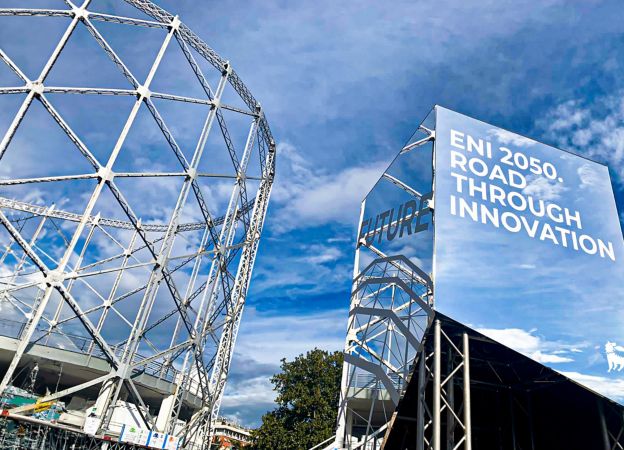4,831
mmcf/d
(millions cubic feet per day) natural gas production (+5% compared to 2023)

Or , our new artificial intelligence tool.
Following the principle of technological neutrality, with diversification of energy sources, we can help to realise the transition to sustainable, secure and affordable energy.
Energy diversification is the basis of our strategy to achieve the Net Zero target whilst ensuring security of supply and access to energy for a world that is growing both demographically and economically.
The diversified utilisation of this variety of sources is expressed both technologically and geographically through:
Our current energy mix confirms the centrality of natural gas as a pillar of energy supply security and a support for energy transition, when taken alongside the development of bioenergy and renewable energies.
New vectors like hydrogen complement existent ones. At the same time, we invest in technological research to find alternative energy sources such as “magnetic confinement fusion” which could change the energy world forever.
Achieving “Net Zero” by 2050 means that we must continue with the progressive decarbonisation of the Oil & Gas industry.
With this in mind, more opportune reservoirs play an increasingly relevant role in the more efficient development and production of new resources, enable the implementation of renewable energies to electrify production activities and the implementation of CO2 capture and storage projects (CCS)
The combination of these three factors - efficiency, renewables and CCS - results in the reduction of scope 1-2-3 emissions.
Geosciences play a fundamental role in the management of these more opportune reservoirs in that they allow us to identify new resources already present therein, and which can be brought into production through existing infrastructures. They are also a means of identifying depleted reservoirs which are most suitable as CCS (carbon capture and storage) plants and then to manage them effectively.

Our Oil & Gas portfolio increasingly relies on natural gas for its lower carbon footprint.

Our strategy puts an emphasis on renewables to support energy diversification and reduce emissions with a Net Zero target by 2050.

The development of bioenergy, through the cultivation of biomass and the production of biomethane, plays a key role in our energy mix.
We are engaged in the entire value chain: from the exploration, development and extraction of natural gas and oil to the generation of electricity from cogeneration and renewable sources, including biorefining, refining and chemistry, both traditional and from renewable sources.
Our activities extend to the end markets, where we sell gas, power and other products to local markets and to retail and business customers, to whom we also provide energy efficiency and sustainable mobility services.


Peer Group of six European energy companies are considered the following: Shell, TotalEnergies, BP, Repsol, Equinor and OMV.
(millions cubic feet per day) natural gas production (+5% compared to 2023)
(billion cubic meters) annual natural gas sales in 2024 (+1% vs. 2023)
(billion cubic meters) annual LNG sales in 2024 (+2% vs. 2023)
installed capacity from the group’s renewable sources (+37% vs. 2023)
biorefining capacity
A network of alliances with producing countries and cooperation agreements with international partners solidify our global portfolio.
A diversified energy mix is possible thanks to the high technological content that we offer all along the value chain: from the exploration, development and extraction of natural gas and oil, to the generation of electricity from cogeneration and renewable sources, including traditional and ecological refining and chemistry and the development of circular economy processes.

If you want to change topic, clear the chat and make a new query to receive more relevant results.
This will delete the question history.
If you want to change topic, clear the chat and make a new query to receive more relevant results. This will delete the question history.
Here you can find the full list of your queries.
The answers are generated by artificial intelligence, therefore they may contain inaccuracies. Please read the terms and conditions of use.

EnergIA is an innovative tool based on artificial intelligence capabilities, which can help you navigate the contents of eni.com, quickly finding answers to your questions. EnergIA can also perform a search on a specific topic, providing the most up-to-date data available, or it can invite you to delve deeper into a topic of your interest by suggesting links and specific readings. Start now!
EnergIA is an innovative tool based on artificial intelligence capabilities, which can help you navigate the contents of eni.com, quickly finding answers to your questions. Start now!
EnergIA (ener'dʒia) is a system based on Generative Artificial Intelligence.
Thanks to this technology, we can respond to your requests by querying the most relevant content and documents available on eni.com. (Note: financial documents from the last 12 months and press releases from the last 2 years are considered.)
Through EnergIA, you can delve into topics of interest and have a real-time window into the world of Eni.
If you wish to search for a specific document, press release or news, use the traditional search engine via the magnifying glass icon.
Like all systems that leverage Generative Artificial Intelligence, EnergIA may generate inaccurate or outdated responses. Always consult the sources that EnergIA proposes as the origin of the generated information.
If the system fails to find an exact match for the requested content, it still tends to provide a response.
If you find any inaccuracies in the provided response, please send us your feedback at the bottom of the page: it will be very helpful for us to improve.
Remember that the content generated by the system does not represent Eni’s official position. We therefore invite stakeholders to refer to their designated contacts for official statements: Press Office for journalists, Investor Relations for analysts and investors, Company Secretariat for shareholders etc..
EnergIA can understand questions posed in almost all languages, but we prefer to provide you with a response in English or Italian, the two languages available on eni.com. If you ask a question in Italian, the content on the site in Italian will be consulted. If you ask it in English or any other language, the content in English will be consulted. (Note: the language Eni uses for financial documents/content is predominantly English.)
If questions are formulated that violate the set security criteria, the system will not proceed with processing the response. Please remember not to send personal data.
By using this service, the users acknowledge that they have read and accepted the terms and conditions of use.
Search
EnergIA (ener'dʒia) is a system based on Generative Artificial Intelligence.
Thanks to this technology, we can respond to your requests by querying the most relevant content and documents available on eni.com. (Note: financial documents from the last 12 months and press releases from the last 2 years are considered.)
Through EnergIA, you can delve into topics of interest and have a real-time window into the world of Eni.
If you wish to search for a specific document, press release or news, use the traditional search engine via the magnifying glass icon.
Like all systems that leverage Generative Artificial Intelligence, EnergIA may generate inaccurate or outdated responses. Always consult the sources that EnergIA proposes as the origin of the generated information.
If the system fails to find an exact match for the requested content, it still tends to provide a response.
If you find any inaccuracies in the provided response, please send us your feedback at the bottom of the page: it will be very helpful for us to improve.
Remember that the content generated by the system does not represent Eni’s official position. We therefore invite stakeholders to refer to their designated contacts for official statements: Press Office for journalists, Investor Relations for analysts and investors, Company Secretariat for shareholders etc..
EnergIA can understand questions posed in almost all languages, but we prefer to provide you with a response in English or Italian, the two languages available on eni.com. If you ask a question in Italian, the content on the site in Italian will be consulted. If you ask it in English or any other language, the content in English will be consulted. (Note: the language Eni uses for financial documents/content is predominantly English.)
If questions are formulated that violate the set security criteria, the system will not proceed with processing the response. Please remember not to send personal data.
By using this service, the users acknowledge that they have read and accepted the terms and conditions of use.
A new window into Eni’s world, at your disposal. EnergIA is an innovative tool based on artificial intelligence capabilities, which can help you navigate the contents of eni.com, quickly finding answers to your questions.




